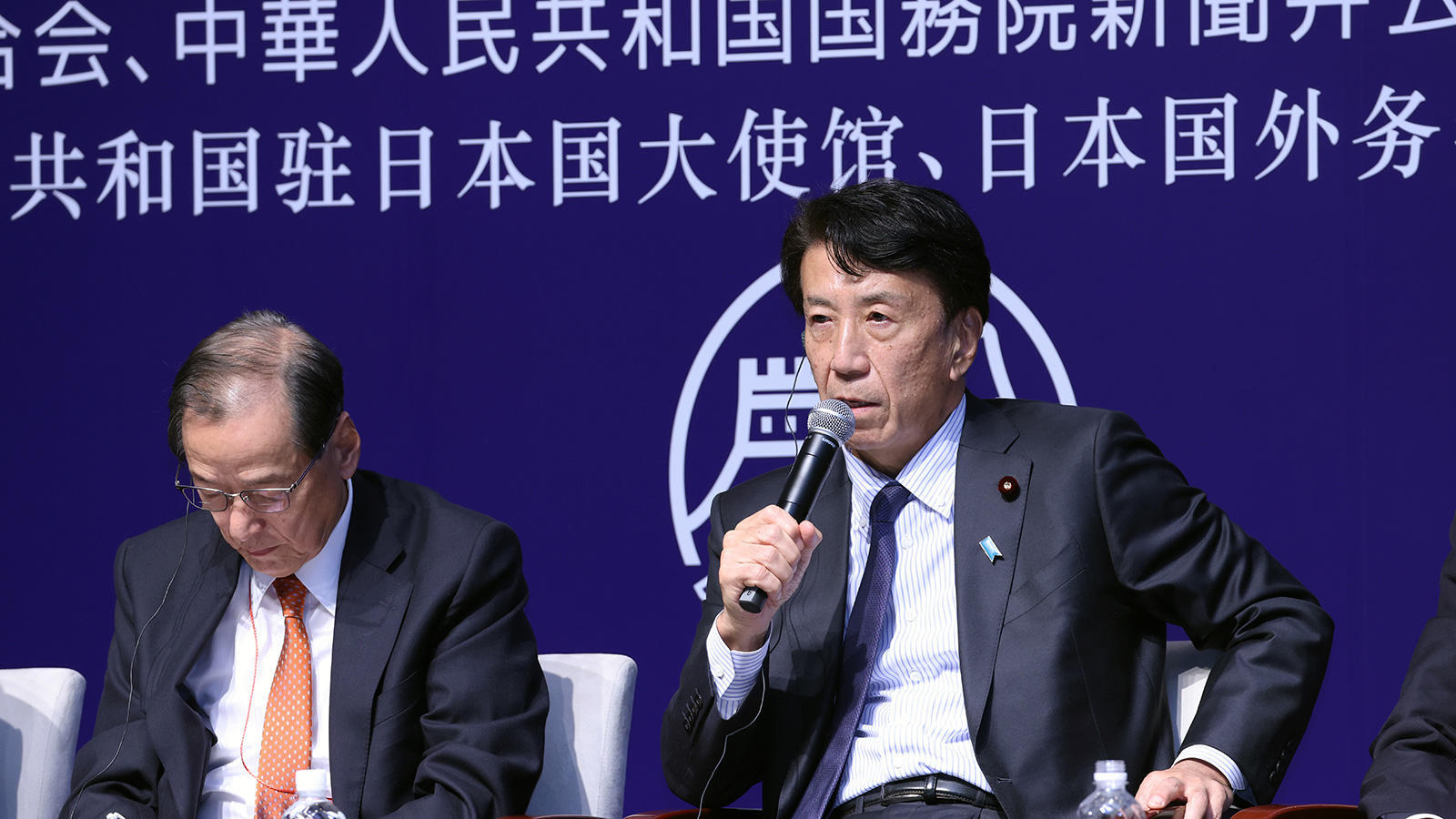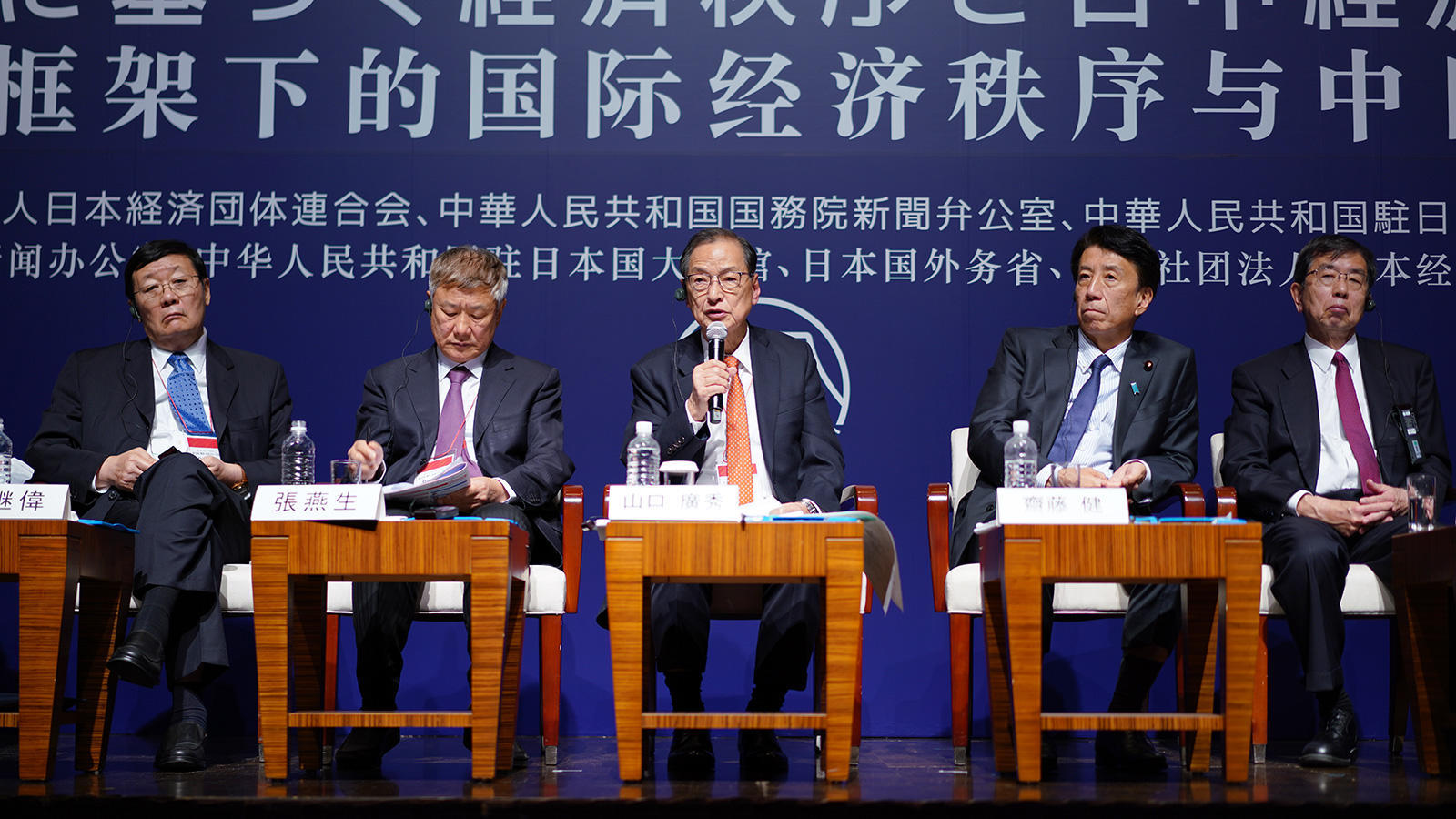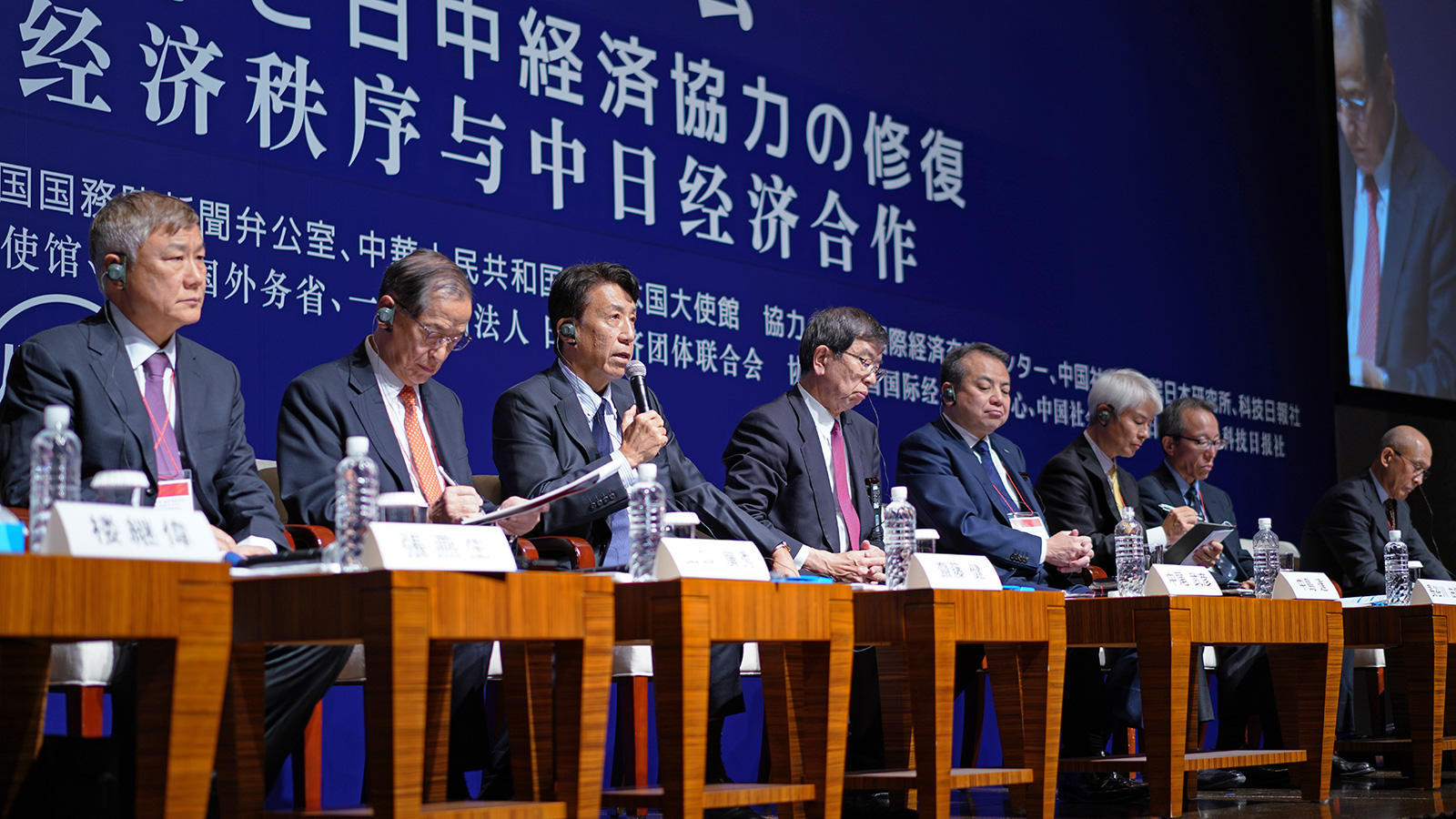The Economic Breakout Session was one of eight such sessions held during the 20th Tokyo Beijing Forum, and this year, the theme for discussion was "Restoring the economic order through multilateralism and Japan-China economic cooperation."
"Win-win" environment needed

Former Minister of Economy, Trade and Industry and current member of Japan's House of Representatives Ken Saito pointed out that foreign direct investment in China fell 80% last year, and suggested that this was the result of policies implemented by the Chinese government.
"China invited foreign investment into its enormous domestic market to acquire technologies and provide heavy subsidies to domestic suppliers, but at the same time, it has gradually began closing the doors to foreign companies entering the market. Furthermore, they are over manufacturing products and exporting them around the world at low prices," Saito said.
"Foreign companies looking to invest in China and those already operating there are growing increasingly concerned about public safety, the ambiguous implementation of the anti-espionage law, and regulations on important outbound cross-border data flow," he added.
Saito also suggested that the "weaponization" of export controls on rare earth metals could be an issue when it comes to economic security.
Former President of the Asian Development Bank Takehiko Nakao emphasized the need for Japan and China to work together to build a "win-win" environment in industry, trade, security, and other areas, noting that, "The world (economy) has grown through trade. If that foundation weakens, growth may slow, or we may end up faced with violent conflict."
China, the US, and Japan play major roles in global economic and trade growth
Former Governor of the People's Bank of China Yi Gang was next to take the podium and spoke about the 30th anniversary of the establishment of the WTO and the development of other multilateral frameworks over the years, expressing his belief in the importance of free trade, investment, and movement of labor.
"Even though free trade can be used to improve the welfare of people around the world, protectionist trade policies are becoming an obstacle to that. The system of global trade is collapsing, the WTO is no longer functioning, and there are no measures in place to settle disputes. It is my hope that we can promote global free trade through regional growth," Yi said.
Former Chinese Vice Minister of Finance Zhu Guangyao added that China, the US, and Japan have particularly important roles to play within the global economic and financial framework. However, Zhu also expressed some concern about the incoming Trump administration, and noted that the heads of government in China and Japan will now need to take up the mantle of leadership. He also touched upon the importance of ensuring the security of supply chains, and protecting the undersea cables that are key to telecommunication networks.
Political pressures could force policymakers to ignore sensible economic policies
Former Chinese Finance Minister Lou Jiwei spoke next about government-led industrial policies.
"Japan has promoted such policies for many years, and China has learned much from Japan. But it is difficult to implement the appropriate policies unless governments have a clear understanding of the direction of the markets," Lou said.
He also spoke about how at the beginning of December, the Chinese government announced that it would be ending tax rebates on aluminum, copper, and other commodities and products, which indicates that it is taking steps to correct the mass export of over-produced goods.
Yi Gang turned the conversation to potential retaliations to tariff increases (as proposed by President-Elect Donald Trump), pointing out the troubling future in store for international trade.
"From a political perspective, public opinion would require the Chinese government to retaliate,"Yi explained. "It's a dilemma that all countries will have to face. Policymakers are being forced into a situation where they must support policies that make little economic sense from an analytical perspective."
Building new business flows into other countries may help halt the emergence of economic blocs
Sumitomo Mitsui Group CEO Toru Nakashima acknowledged that overseas transactions must be handled with caution, but said, "The majority of Japanese business leaders believe in the importance of free trade and free capital movement. However, we saw supply chains break down during the pandemic, and businesses have been disrupted by the war in Ukraine."
He added that between Japan and China, "It is important to start by cooperating in areas where we can do so on a global scale, such as shared environmental issues that both can tackle, and in decarbonization efforts. This will help foster trust in the relationship."
Yoshiki Hasegawa, President of MUFG Bank (China), spoke about his perspective on doing business in China.
"Even with the smallest possible investment, profits can be made by doing business with people who know the Chinese market well," Hasegawa said. "We are starting to see new innovations born out of collaborations between Japanese and Chinese partners, and by creating new business flows through exports to third countries, it may be possible to stop the emerging trend of protectionist economic blocs."
Economic structure in Japan and China shifting from vertical to horizontal division of labor
Hu Xiaolian of the China Center for International Economic Exchanges served as Deputy Governor of the People's Bank of China, and as Chairman of the Export-Import Bank of China. Hu argued that free trade plays a significant role in global economic growth, has major benefits to both society and its people, and "increases corporate strength" through innovation and competition. He pointed out that Chinese-built electric vehicles (EVs) are an example of this, as due to the technological breakthroughs made by Chinese companies, Chinese EVs have become a competitive part of the global marketplace.
Osaka University Professor of Economics Tomoyuki Fukumoto formerly worked at the Bank of Japan as Director-General of the International Department, and he stated that the world is entering an era in which "smart globalization is demanded." Fukumoto explained that for such globalization to be considered "smart," it must be capable of handling protectionism, geopolitics, and other such issues on a case-by-case basis. He added that he believes that the economic structure of Japan and China is at a turning point, switching from a vertical division of labor to a horizontal one, and he expressed hope that, "Alliances will be formed between companies in Japan and China, which will then create new businesses that can expand within China and into other countries. Trade and investment in Japan and China could enter a new phase by creating a system that allows for quick decisions and responses."
University of Tokyo Professor Emeritus Masahiro Kawai, former Dean and CEO of the Asian Development Bank Institute, suggested that Japan and China could augment the role of the WTO.He provided a concrete example of how they could do this when he called on the two countries to,"be more proactive in increasing regional trade transactions and other arrangements."
Building a track record as trustworthy partners
"China will doubtlessly continue to attract the world as a promising market," said Toru Nakashima, touching upon the future of Japan-China economic relations. Nakashima noted that one reason for this is that predicted high levels of demand has resulted in major investment in semi-conductor manufacturing equipment. However, he added, "Although there are some issues remaining, such as the need to ensure the safety of Japanese nationals, the implementation of export control measures, and geopolitical threats, both Japan and China should work together to resolve these points and build a partnership based on mutual trust."
Session moderator Hirohide Yamaguchi closed the breakout session, saying, "There is still much work to be done, and this includes increasing cooperation with third countries, but it is my hope that Japan and China will work together to strengthen their cooperative relationship."


Post a comment